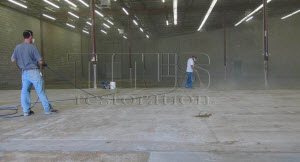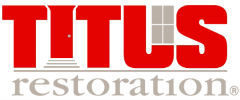Depending on the needs and traffic of your facility, there are various concrete floor sealing options that can help you achieve the floor you desire. If the floor is a newly constructed slab or a old slab in need of renovation, there are concrete sealer options that will fit your budget and needs.
 Concrete Floor Sealing Options:
Concrete Floor Sealing Options:
1. Sealing New Slabs: When concrete slabs are poured there is typically a sealer or curing agent that is applied, but is it the sealer that you want? Specifying the right sealer for you concrete floor is your choice. There are penetrating sealers that harden the slab and seal it from dust, but there are also dissipating sealers that are just intended for the curing process. In addition, some light grinding can be done before the slab is sealed to open up the pores and allow better penetration of the sealer into the concrete.
2. Clean and Seal Old Slabs: When a concrete floor has already endured years of use, there are probably signs of it – forklift tire marks, stains, and possibly some damage. To clean and re-seal is a good option for a new start on an old concrete floor. If you are currently utilizing the space or the space is empty, Titus can phase the work to meet your needs.
3. Polish and Seal Concrete: For a the most-effective concrete floor sealing project, polishing the concrete in addition to sealing it provides a cost-effective and maintenance friendly flooring. Many retailers, warehouses, and manufacturing plants are switching to a polished and sealed concrete floor because of the ease of maintenance. Read more about polished concrete here.
Concrete Floor Sealers Available:
1. Penetrating Floor Sealers: A penetrating concrete floor sealer is an ideal way to dustproof and harden the concrete surface. A lithium silicate densifier is a Titus recommended concrete floor sealer because of it’s superior properties.
2. Topical Floor Sealers (Coatings): If the concrete floor is in need of chemical or acid resistance, a chemical or acid resistant coating is recommended to protect the concrete. Because these are topical and not penetrating sealers, there is going to be surface prep and a replacement cost once the sealer has worn away.
